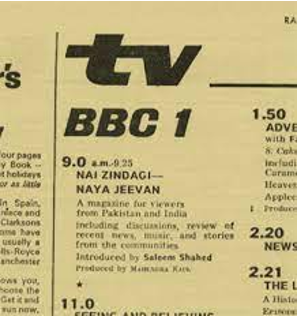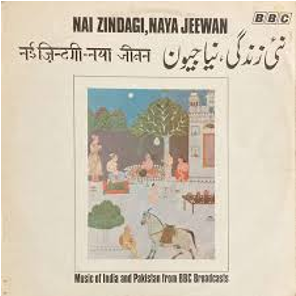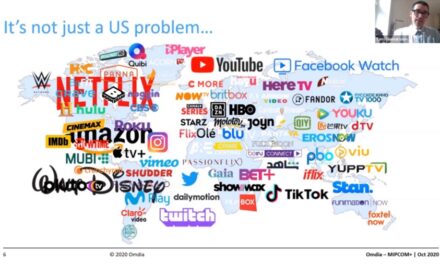In August 2022, I secured a slot at the BBC Written Archives Centre (WAC) in Caversham to look at the archives for Nai Zindagi Naya Jeevan (BBC1, 1968-1982). This was a groundbreaking programme produced for the British Asian diaspora. On Sunday mornings, families congregated in front of the television and watched the news bulletins, political discussions and community reports, patiently waiting for the closing section. Each week, at the end of the programme, there was either a live musical performance or a song from an Indian film, the latter being the focus of my research.

One of the archivists I had been communicating with over the past few months led me into the Reading Room. It contained eight tables, grouped into four areas, and I was allocated a desk next to a large window. Three other researchers were already poring over their documents of interest. As I sat down and looked over at the two-tiered trolley holding some box files and a scattering of foolscap folders, I experienced a slight sense of disappointment.
An email previously sent to me from the WAC stated:
Although we still do not have any production files specifically for “Nai Zindagi Naya Jeevan”, I have now found a larger number of files focused on programming for immigrants in the period the show was on the air – please see attached spreadsheet. (01/08/2022)
The files contained archives ranging from policies to management registries. The Schools, Colleges and Youth Programmes file included materials created by the BBC to support the integration and education of young immigrant children who, like myself, were new arrivals. With a lack of archival papers specifically related to Nai Zindagi Naya Jeevan, these ‘general’ documents became even more important as they provided a useful overview of minority programming, and some invaluable insights of how migrant communities were once perceived by the BBC. It is worth noting that if I requested to view these materials today, with the current restrictions in place at the WAC, they would not now be vetted and opened, and therefore unavailable to access.

When working on older television historiography, ‘one of the main issues is the lack of visual material’ (Medhurst, 2022: 6). Paper archives become essential for researchers seeking lost and forgotten moments, where ‘production files, publicity materials, correspondence, listing guides, broadcast logs’ (Moseley and Wheatley, 2008: 155) can reconstruct aspects of a programme where the visual format no longer exists.
From the same email, it also stated:
I have not been able to find the scripts in our holdings. My best guess as to why this is the case is that “Nai Zindagi Naya Jeevan” was produced in Birmingham – although we do have scripts from shows produced in the regions, the holdings are more patchy than for those produced in London. (01/08/2022)
The presenters and guests on Nai Zindagi Naya Jeevan usually communicated primarily in Hindustani, understood by both Hindi and Urdu speakers. To learn that the scripts of such a unique BBC production could not be located was disappointing. If these scripts were written in an Indian dialect, it is possible they were disposed of without fully understanding their worth. Materials associated with minority audiences were possibly ‘too experimental to be of value’ (Medhurst, 2022: 4) and subsequently overlooked. Although, fourteen years of continuous broadcasting for a single programme is no longer experimental.
A recurring theme of items gradually lost, discarded and misplaced, highlights a disregard for preserving the history of ‘ordinary television’ (Bonner, 2003). As this research project develops, the scarcity of materials within institutional archives and academic texts regarding Indian cinema on British television becomes more apparent. Most material ‘which has featured Black people or been filmed by Black people is not in the archives… [and] discriminatory approaches within archiving policy and collections departments have also indisputably been a factor’ (Malik, 2002: 4). Similar discrimination is reflected in our wider society today, where the complex experiences of minority groups are often simplified and silenced by populist politicians and their followers. Sometimes it feels little has changed since our forebears arrived all those decades ago.
The 1960s and 1970s was a period of cultural and socio-political flux, both for South Asian communities adapting to British life and the BBC responding to these new arrivals. The WAC holds documentation on how the BBC observed, discussed, interpreted and recorded our multicultural society for the past century. My PhD aims to explore how Nai Zindagi Naya Jeevan, accessed through focus groups recording the voices of the elderly and include analyses of availability and address by the BBC. The ‘programmes for immigrants’, already inadequately reflected in the archives, are now at risk of becoming completely inaccessible, leading to the minority experiences being further erased from our televisual and socio-cultural history.
Dipali Das is a PhD student at Edge Hill University. After careers in Engineering and Teaching, she completed an MA in Film and Media examining the role and representation of the sari for women within colonial and post-colonial Indian Cinema.
References
Bonner, F. (2003) Ordinary Television. London: Sage Publications.
Malik, S. (2002) Representing Black Britain: Black and Asian Images on Television. London: Sage.
Medhurst, J. (2022) The early years of television and the BBC. Edinburgh: Edinburgh University Press.
Moseley, R. and Wheatley, H. (2008) ‘Is Archiving a Feminist Issue? Historical Research and the Past, Present, and Future of Television Studies’ Cinema journal 47 (3) pp. 152–158
Nai Zindagi Naya Jeevan (BBC 1968 – 1982)




